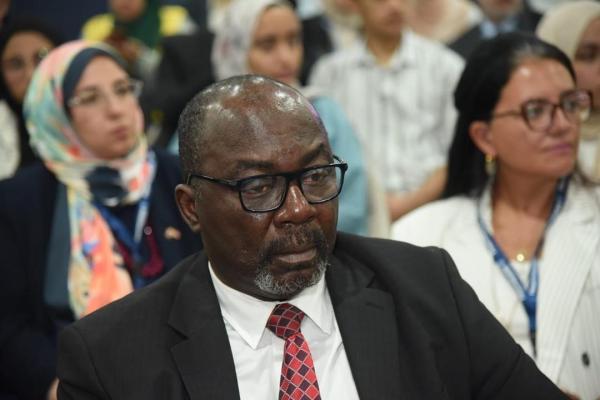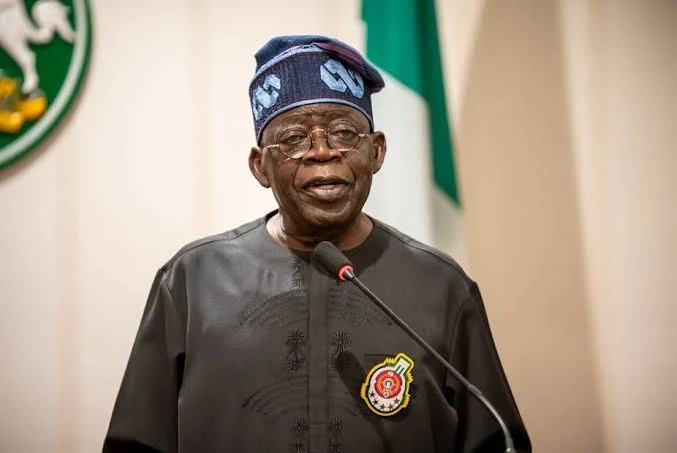
LAGOS — Capital Oil and Gas Industries Limited said it was releasing, last night, about 13 million litres, approximately 400 trucks, of petroleum products including premium motor spirit, popularly called petrol, to ease the scourge of the endemic fuel scarcity that Nigeria had been plunged into.
The company will release a total of 70 million litres in the coming days.
The move has, therefore, broken the ranks of oil marketers and depot operators, who have refused to import any more products until their outstanding subsidy claims of over N200 billion is paid by the Federal Government.
The marketers have now become jittery over the development because they are now being exposed as saboteurs, seeing they have enough fuel stock in their depots but have refused to dispense them, even as they are losing billions of Naira daily.
Long queue of jerry cans at a petrol station as fuel scarcity bites harder, yesterday. Photo: Joe Akintola, Photo Editor.
Sequel to the general elections, the country had been experiencing sporadic fuel shortages, until it snowballed into a complete shutdown in the recent weeks, thereby paralysing almost all social and economic activities in the country.
Speaking, yesterday, about the sudden release of the product at the Capital Oil Depot in Apapa, Managing Director/Chief Executive Officer, Mr. Ifeanyi Ubah, told journalists that the move was meant to reduce the pain Nigerians are experiencing on account of the scarcity.
It’s sabotage
Ubah described the current crisis as sabotage, saying: “We are constrained at this point and have decided that two wrongs cannot make a right. We will not be part of this sabotage against our fatherland. Therefore, from this minute, we shall take the risk of opening our facilities and commence swift loading and distribution of products nationwide.”
He also gave the assurance that once the current stock is exhausted, there are vessels laden with petroleum products at the jetty waiting to berth.
He said: “Our facility has the capacity to load over 13 million litres before dawn. This comes to approximately 400 trucks of petroleum products.”
Urges other marketers to follow suit
Expressing the hope that normalcy will soon return with the resumption of socio-economic activities, Ubah also called “on other petroleum marketers to follow suit and save our nation from this impending economic and social crisis.”
He added that the current situation called for patriotism and service, which is why the Capital Oil truck park, port and depot reception facilities have been opened and have commenced loading of products and ordered to move overnight to every state of the federation.
He recalled that operators were informed of the shutdown of loading activities from the depots via a text message on Saturday May 16, which became effective on Monday, May 18
He noted that since then Nigerians have suffered immense hardship, with petrol now selling at an all-time high of between N500 and N1000 per litre depending on location and outlet.
Marketers and black market operators have been at their best in sharp practices, while the industry regulator, the Department of Petroleum Resources, DPR, is overwhelmed by it all and helpless to sanction any one for infractions.”
Against this backdrop, the Capital Oil boss argued that the way out of the current predicament is the total deregulation of the downstream petroleum sector.
Breaking of ranks
Other marketers and depot operators have expressed shock at Capital Oil’s action, saying that they will have to wait to see the turn of events from today (Monday), to determine whether or not to join the bandwagon.
A source among the independent marketers told Vanguard on telephone: “For now, it may not be able to join Captal Oil because we may not be able to get the kind of security made available to him to pull this off.”
He agreed that the marketers have enough products to meet the demand, as many of the depots already had ample stock levels before the decision to shut down.
He admitted that the move by Capital Oil will be an eye opener to other marketers with regard to keeping agreements, as they are losing billions of Naira daily due to the shut down.
Economic stagnation
Meanwhile, economic activities in Nigeria have continued to wind down, as the fuel scarcity takes a turn for the worse while power supply hit an all time low.
Long queue of jerry cans at a petrol station as fuel scarcity bites harder, yesterday. Photo: Joe Akintola, Photo Editor.
The scarcity and power outage have affected businesses negatively, leading to a significant increase in the cost of doing business across all sectors of the economy, thereby worsening the poverty situation among the masses.
Already, many flights, both domestic and international, were cancelled over the weekend due to the scarcity of aviation fuel. Arik and Aero Contractors were the major airlines that cancelled their flights yesterdaty; Transport fares have also been hiked by over 300 per cent and businesses shut down due to fuel shortages to power their operations, just as the cost of certain goods and services have skyrocketed.
Vanguard observed that simple services like a haircut, which normally cost N200 in Abuja, now goes for between N250 and N300, while the price of certain food items have gone up.
Also, workers are finding it difficult and very expensive commuting to and from their places of work on a daily basis while the few who still drive to their offices spend a large chunk of their income on petrol.
Respondents who spoke to Vanguard expressed anger at the current state of affairs, stating that the persistent fuel scarcity witnessed over the last couple of months is the worst in the history of Nigeria, adding that Nigerians have never had it so tough like this before.
One of the respondents urged the Nigeria Labour Congress, NLC, to call for a nationwide strike until the fuel situation is addressed.
In Lagos, only the Capital Oil outlets with a handful of independent filling stations were seen dispensing fuel.
In Abuja, all the petrol stations in town were shut down, while many of those around the Gwagwalada area were dispensing the product at between N150 and N170 per litre.
Also, majority of the petrol stations after Mararaba in Nasarawa State, were selling the commodity at between N150 and N170 per litre with large number of motorists struggling to purchase the product despite the high cost.
Black marketers, who are the major source of petrol for 95 per cent of motorists and households also hiked their prices, selling at between N250 and N300 per litre.
Oil workers’ meeting
Hope of speedy resolution of the crisis was dampened further yesterday, as the striking workers of the Nigerian National Petroleum Corporation, NNPC, who held a closed door meeting failed to reach an agreement over a number of issues.
A source in the NNPC told Vanguard that there were disagreements by executives of the Nigeria Union of Petroleum and Natural Gas Workers, NUPENG, and Petroleum and Natural Gas Senior Staff Association of Nigeria, PENGASSAN, in the meeting which started about 3pm and was still holding at press.
The source, who chose to remain anonymous also disclosed that some of the executives of both associations engaged in heated arguments.
Furthermore, as a result of the strike, power supply worsened across the country, dropping below 1,000 megawatts, MW, with most households enjoying power supply for less than three hours daily.
Specifically, the Abuja Electricity Distribution Company, weekend, sent text messages to some of its customers, appealing for calm and understanding over the worsening power supply situation.
The company blamed the worsening electricity situation to a reduction in its power allocation from about 400MW to below 200MW.
To this end, anger, frustration and uncertainty pervaded everywhere as Nigerians are of the view that the Federal Government seemed unconcerned about their plight.
The situation seems to have defied all solutions while the Ministers of Power and Petroleum Resources seem to have run out of ideas on how to tackle the crisis.
The fuel crisis came on the heels of a disagreement between the Federal Government and oil marketers over subsidy payments, while it was escalated by the strike of Petroleum Tanker Drivers, PTD, NUPENG and PENGASSAN.
PTD’s strike was in solidarity with the oil marketers over the delay in subsidy payments, while NUPENG and PENGASSAN’s strike was due to the transfer of operatorship rights in two oil blocks, OML 40 and 42, to local firms, Neconde and Elcrest.
The strike by NUPENG and PENGASSAN, in addition to worsening fuel supply, also led to a disruption in gas supply to power generating plants across the country, thereby cutting power supply drastically.






















